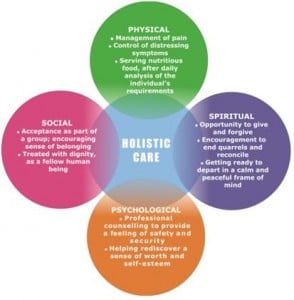The Importance of Holistic Nursing Care: How to Completely Care for your Patients

The American Holistic Nurses Association defines holistic nursing as the practice of caring for the entire person with the goal of healing. This concept, focusing on the whole person rather than just the physical body, traces its roots back to Florence Nightingale. Florence Nightingale is well-known for her dedication to caring for those unable to care for themselves and is considered one of the early holistic nurses due to her emphasis on the connection between patients and their surroundings. Nursing has evolved significantly since Nightingale’s time, yet the constant presence of illness and its impact on individuals remains unchanged.
Sickness can affect anyone, regardless of their strength. As nurses, understanding how diseases impact our patients is crucial. The demanding nature of nursing, with high patient loads and time constraints, may lead to merely addressing the physical aspects and moving on to the next patient. However, it is vital to view individuals as whole beings, not just patients or diagnoses. Holistic nursing care extends beyond the physical, encompassing the mind, body, and soul. It requires consideration of the effects of illness on emotions, spirituality, personal relationships, and even social and cultural differences. Each person is unique, and our approach to patient care should reflect that individuality.

Struggling to meet your deadline?
Get your assignment on The Importance of Holistic Nursing Care: How to Completely Care for your Patients done by certified MDs and PhDs in the USA. ORDER NOW!
 Holism transcends specific actions or words; it is a philosophy ensuring comprehensive care for every aspect of a patient. Holistic nurses recognize and treat each individual differently, often earning praise from patients as those who genuinely care. While being task-oriented or goal-oriented is acceptable, an excessively hurried or task-focused approach may leave patients feeling dehumanized. Balancing various responsibilities, including patient needs, charting, and dealing with family members, poses a challenge for nurses. Achieving balance transforms duties into privileges and contributes to success.
Holism transcends specific actions or words; it is a philosophy ensuring comprehensive care for every aspect of a patient. Holistic nurses recognize and treat each individual differently, often earning praise from patients as those who genuinely care. While being task-oriented or goal-oriented is acceptable, an excessively hurried or task-focused approach may leave patients feeling dehumanized. Balancing various responsibilities, including patient needs, charting, and dealing with family members, poses a challenge for nurses. Achieving balance transforms duties into privileges and contributes to success.
Holistic nursing care not only enhances patients’ lives but also enriches the lives of nurses themselves. Nursing is demanding on physical, mental, and emotional levels. Moments reminding nurses why they chose this profession are interspersed with challenges. Holistic nursing care can improve overall patient care experiences and positively impact nurses’ well-being. The key lies not in the duration of interactions but in how nurses utilize their time with patients. Prioritizing psychological and emotional well-being fosters positive relationships, resulting in improved patient outcomes and increased satisfaction and purpose in nursing work.
There are numerous simple ways to enhance relationships with patients and foster a positive psychological, emotional, and spiritual atmosphere.
1. Learn the Patient’s Name: Take the time to know the patient’s name and use it during interactions.
2. Make Strong Eye Contact: Establish good, strong eye contact to convey attentiveness and connection.
3. Ask about Feelings: Inquire about the patient’s feelings genuinely and show sincere care for their well-being.
4. Smile and Laugh Appropriately: Use smiles and laughter when appropriate to create a positive and comforting environment.
5. Therapeutic Touch: Utilize therapeutic touch to provide comfort and support.
6. Promote Self-Image: Assist the patient in recognizing their worth and deserving of dignity.
7. Preserve Dignity: Ensure the preservation of the patient’s dignity in all interactions.
8. Educate on Self-Care: Educate patients on the importance of self-care for their well-being.
9. Address Anxiety and Pain: Ask patients about their anxiety or pain levels and explore ways to reduce them.
10. Non-Pharmacological Pain Control: Use non-pharmacological methods for pain control, such as imagery and relaxation techniques.
11. Encourage Alternative Treatments: Support and encourage alternative treatment modalities like massage, aromatherapy, or music therapy.
12. Respect Beliefs: Inquire about patients’ religious, cultural, or spiritual beliefs and be accepting and sensitive to their preferences.

These changes contribute to a holistic approach to patient care, emphasizing the intention to care for the whole person and being present for them. The essence of holistic nursing is not just about performing specific actions but fostering a genuine connection with each patient. Holistic nursing can be practiced in any healthcare setting.
For those deeply interested in holistic nursing, there are certifications available after thorough education on the subject. The Journal of Holistic Nursing is a valuable online resource and can be found online: http://jhn.sagepub.com/. Certifications from the American Holistic Nurse Certification Corporation (AHNCC) are attainable with an RN licensure or higher, but holistic care is not exclusive to certain nursing roles. All nurses, including LPNs, can provide holistic care, as it is a part of the curriculum in many nursing schools. Whether experienced or new to holistic nursing, focus on building strong patient-nurse relationships and promoting healing in various ways, keeping in mind the guiding question: What would Florence do?

Dont wait until the last minute.
Provide your requirements and let our native nursing writers deliver your assignments ASAP.
